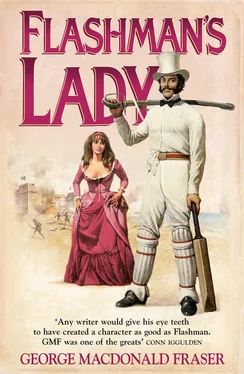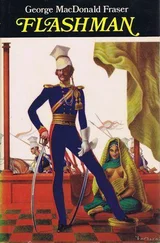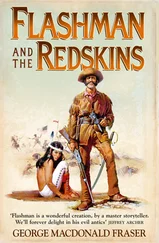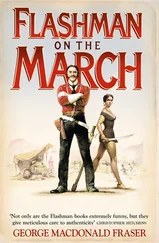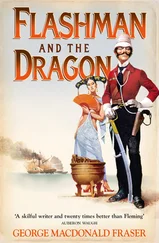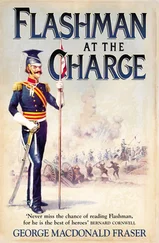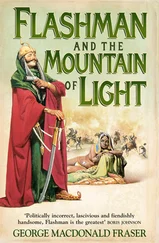When Hughes axed Flashman from Tom Brown’s Schooldays , brutally and suddenly (on page 170, if I remember rightly), it seemed a pretty callous act to abandon him with all his sins upon him, just at the stage of adolescence when a young fellow needs all the help and understanding he can get. So I adopted him, not from any charitable motives, but because I realised that there was good stuff in the lad, and that with proper care and guidance something could be made out of him.
And I have to say that with all his faults (what am I saying, because of his faults) young Flashy has justified the faith I showed in him. Over the years he and I have gone through several campaigns and assorted adventures, and I can say unhesitatingly that coward, scoundrel, toady, lecher and dissembler though he may be, he is a good man to go into the jungle with.
George MacDonald Fraser
Dedication Dedication Explanatory Note Maps Chapter 1 Chapter 2 Chapter 3 Chapter 4 Chapter 5 Chapter 6 Chapter 7 Chapter 8 Chapter 9 Chapter 10 Chapter 11 Chapter 12 Chapter 13 Keep Reading Appendix I Appendix II Appendix III Footnotes Notes About the Author The FLASHMAN Papers: In chronological order The FLASHMAN Papers: In order of publication Also by George MacDonald Fraser About the Publisher
For K, 6
Contents
Cover
Title Page
Copyright
How Did I Get the Idea of Flashman ?
Dedication
Explanatory Note
Maps
Chapter 1
Chapter 2
Chapter 3
Chapter 4
Chapter 5
Chapter 6
Chapter 7
Chapter 8
Chapter 9
Chapter 10
Chapter 11
Chapter 12
Chapter 13
Keep Reading
Appendix I
Appendix II
Appendix III
Footnotes
Notes
About the Author
The FLASHMAN Papers: In chronological order
The FLASHMAN Papers: In order of publication
Also by George MacDonald Fraser
About the Publisher
Since the memoirs of Flashman, the notorious Rugby School bully and Victorian military hero, first came to light ten years ago, and have been laid before the public as each successive packet of manuscript was opened and edited, a question has arisen which many readers have found intriguing. The five volumes published so far have been in chronological order, spanning the period from 1839, when Flashman was expelled and entered the Army, to 1858, when he emerged from the Indian Mutiny. But not all the intervening years have been covered in the five volumes; one gap occurs between his first meeting with Bismarck and Lola Montez in 1842–3, and his involvement in the Schleswig-Holstein Question in 1848: yet another between 1849, when he was last seen on the New Orleans waterfront in the company of the well-known Oxford don and slave-trader, Captain Spring, MA, and 1854, when duty called him to the Crimea. It has been asked, what of the ‘missing years’?
The sixth packet of the Flashman Papers supplies a partial answer, since it deals with its author’s remarkable adventures from 1842 to 1845. It is clear from his manuscript that a chance paragraph in the sporting columns of a newspaper caused him to interrupt his normal chronological habit, to fill in this hiatus in his earlier years, and from the bulk of unopened manuscript remaining it appears that his memoirs of the Taiping Rebellion, the U.S. Civil War, and the Sioux and Zulu uprisings are still to come. (Indeed, since a serving officer of the United States Marines has informed me that his Corps’ records contain positive pictorial evidence of Flashman’s participation in the Boxer Rebellion of 1900, there is no saying where it may end.)
The historical significance of the present instalment may be thought to be threefold. As a first-hand account of the early Victorian sporting scene (on which Flashman now emerges as a distinguished if deplorable actor) it is certainly unique; on a different plane it provides an eye-witness description of that incredible, forgotten private war in which a handful of gentlemen-adventurers pushed the British imperial frontier eastwards in the 1840s. Lastly, it sheds fresh light on the characters of two great figures of the time – one a legendary Empire-builder, the other an African queen who has been unfavourably compared to Caligula and Nero.
A small point which may be of interest to students of Flashman’s earlier memoirs is that the present manuscript shows signs of having been lightly edited – as was one previous volume – by his sister-in-law, Grizel de Rothschild, probably soon after his death in 1915. She has modified his blasphemies, but has not otherwise tampered with the old soldier’s narrative; indeed, she has embellished it here and there with extracts from the private diary of her sister Elspeth, Flashman’s wife, and with her own pungent marginal comments. In the presence of such distinguished editing, I have confined myself to supplying foot-notes and appendices, and satisfying myself of the accuracy of Flashman’s account of historical events so far as these can be checked.
G.M.F.
So they’re talking about amending the leg-before-wicket rule again. I don’t know why they bother, for they’ll never get it right until they go back to the old law which said that if you put your leg in front of the ball a-purpose to stop it hitting the stumps, you were out, and d----d good riddance to you. That was plain enough, you’d have thought, but no; those mutton-brains in the Marylebone club have to scratch their heads over it every few years, and gas for days on end about the line of delivery and the point of pitch, and the L--d knows what other rubbish, and in the end they cross out a word and add another, and the whole thing’s as incomprehensible as it was before. Set of doddering old women.
It all comes of these pads that batters wear nowadays. When I was playing cricket we had nothing to guard our precious shins except our trousers, and if you were fool enough to get your ankle in the way of one of Alfie Mynn’s shooters, why, it didn’t matter whether you were in front of the wicket or sitting on the pavilion privy – you were off to get your leg in plaster, no error. But now they shuffle about the crease like yokels in gaiters, and that great muffin Grace bleats like a ruptured choirboy if a fast ball comes near him. Wouldn’t I just have liked to get him on the old Lord’s wicket after a dry summer, with the pitch rock-hard, Mynn sending down his trimmers from one end and myself going all-out at t’other – they wouldn’t have been calling him the ‘Champion’ then, I may tell you; the old b-----’s beard would have been snow-white after two overs. And the same goes for that fat black nawab and the pup Fry, too.
From this you may gather that I was a bowler myself, not a batter, and if I say I was a d----d good one, well, the old scores are there to back me up. Seven for 32 against the Gentlemen of Kent, five for 12 against the England XI, and a fair number of runs as a tail-end slogger to boot. Not that I prided myself on my batting; as I’ve said, it could be a risky business against fast men in the old days, when wickets were rough, and I may tell you privately that I took care never to face up to a really scorching bowler without woollen scarves wrapped round my legs (under my flannels) and an old tin soup-bowl over my essentials; sport’s all very well, but you mustn’t let it incapacitate you for the manliest game of all. No, just let me go in about number eight or nine, when the slow lobbers and twisters were practising their wiles, and I could slash away in safety, and then, when t’other side had their innings – give me that ball and a thirty-pace run-up and just watch me make ’em dance.
It may strike you that old Flashy’s approach to our great summer game wasn’t quite that of your school-storybook hero, apple-cheeked and manly, playing up unselfishly for the honour of the side and love of his gallant captain, revelling in the jolly rivalry of bat and ball while his carefree laughter rings across the green sward. No, not exactly; personal glory and cheap wickets however you could get ’em, and d--n the honour of the side, that was my style, with a few quid picked up in side-bets, and plenty of skirt-chasing afterwards among the sporting ladies who used to ogle us big hairy fielders over their parasols at Canterbury Week. That’s the spirit that wins matches, and you may take my word for it, and ponder our recent disastrous showing against the Australians while you’re about it. 1
Читать дальше
